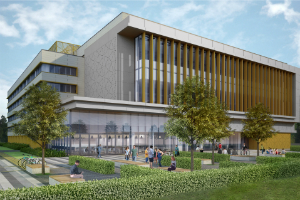'2026: TRANSFORM' programme to create “world-class” University facilities
Release Date 12 July 2016

The University of Reading is investing more than £200 million in a major capital investment programme to redevelop campus facilities for future students.
The 2026: TRANSFORM programme is driven by the University's ambition to become a larger, vibrant and more sustainable institution by its centenary year, 2026.
Live projects under the programme are the redevelopments of the Library and URS Building, the creation of the Chancellors Building and the newly-formed School of Architecture, the refurbishment of the Van Emden lecture theatre and the redevelopment of residential accommodation at Greenlands.
Vice-Chancellor Sir David Bell said: "By 2026, we want the University of Reading to become renowned for its world-class facilities. We want to build on the improvements we have already made, in a bid to transform our campus into a truly contemporary and innovative space.
"Many of the projects within the programme stem directly from student feedback, such as the need for extra study space and better technical resources. Other driving factors include sustainability, environmental impact and improved use of space."
In addition to the projects currently underway, funding has been approved for two new projects - the creation of a brand new Health & Life Sciences Building, and the extension of teaching space at Henley Business School.
Health & Life Sciences Building
The University's Life Sciences courses have experienced substantial growth over recent years. As a means of coping with the increased demand and improving facilities, the School of Biological Sciences will be consolidated into a brand new purpose-built facility.
The University is investing approximately £55 million into the new project, which includes the demolition of the Engineering Building, Knight Building, AMS Tower and Harborne Building. The project is anticipated to begin in the summer of 2017 and aims to be completed by mid-2019, subject to planning permission.
Key features of the new building include a bioresources unit, teaching and research laboratories and a new café. The building will also become the new home of the Cole Museum of Zoology.
Henley Business School teaching space expansion
Approximately £31 million will be invested into the creation of additional teaching space at Henley Business School.
Student uptake for Henley Business School is consistently high, and with a greater number of students studying at the Whiteknights campus, there is a pressing need for extra space.
The project seeks to remodel the existing Henley Business School sites internally to help maximise space usage and function. Small areas of space will be expanded to help increase operational space.
A new five-floor teaching block will also be created, with key features including two new large lecture theatres, seminar rooms and a dedicated MBA suite for up to 100 delegates.
To unite the existing and new buildings, a large enclosed space will link the two sites. This area will also be available to use for events and functions.
The expansion will also benefit the wider University as it will help offset the loss of teaching space encountered during other redevelopments. Construction is anticipated to begin in summer 2017 and is expected to be completed by mid-2019.
Professor John Board, Dean of Henley Business School, said: "I am delighted with this development. It will allow students from wherever they come and at whatever level they study to have an outstanding experience in an environment that properly reflects Henley's global position and academic quality."
Further information on the programme can be found at www.reading.ac.uk/about/2026-transform/current-projects-capital-investments.aspx.
